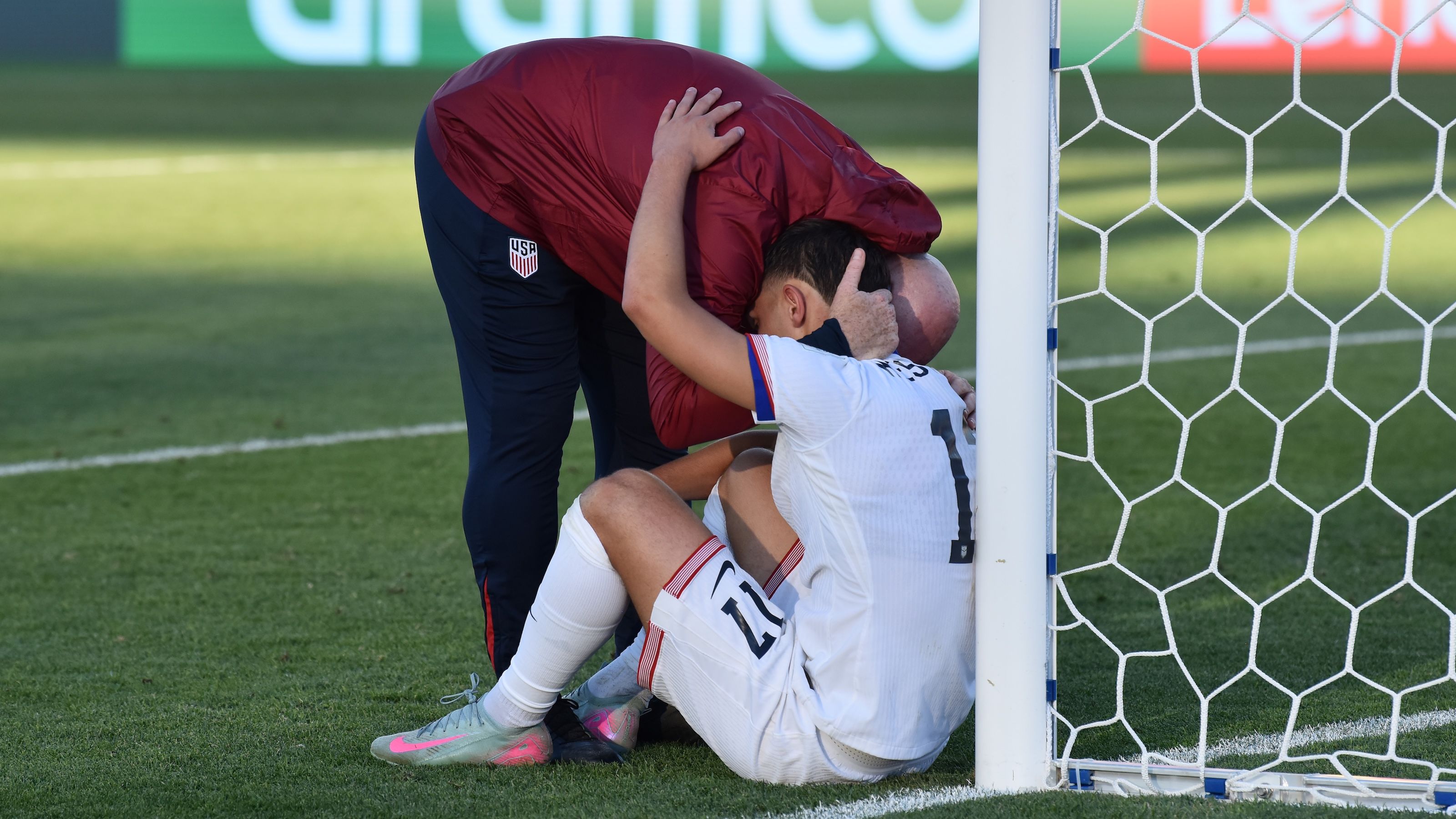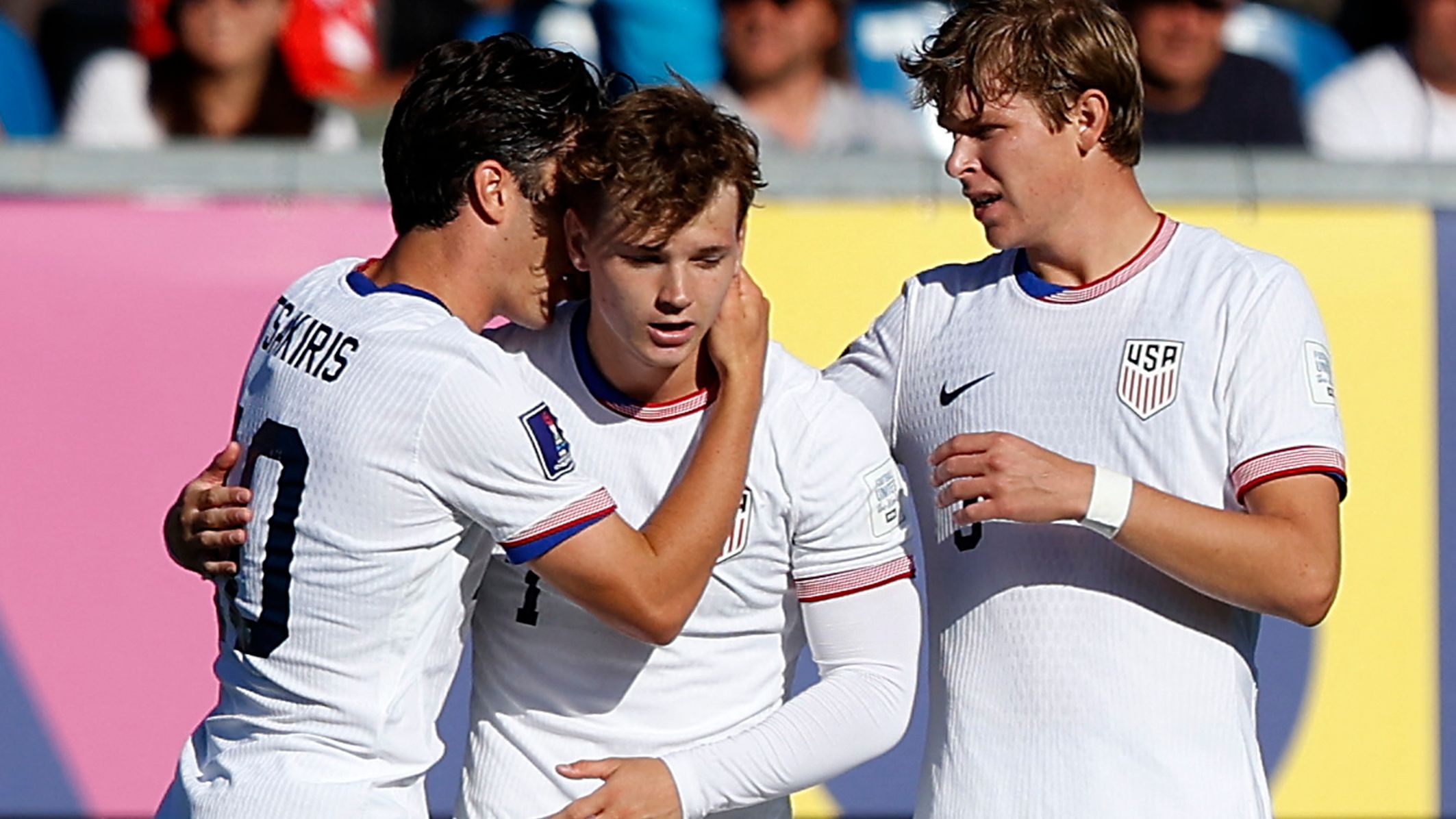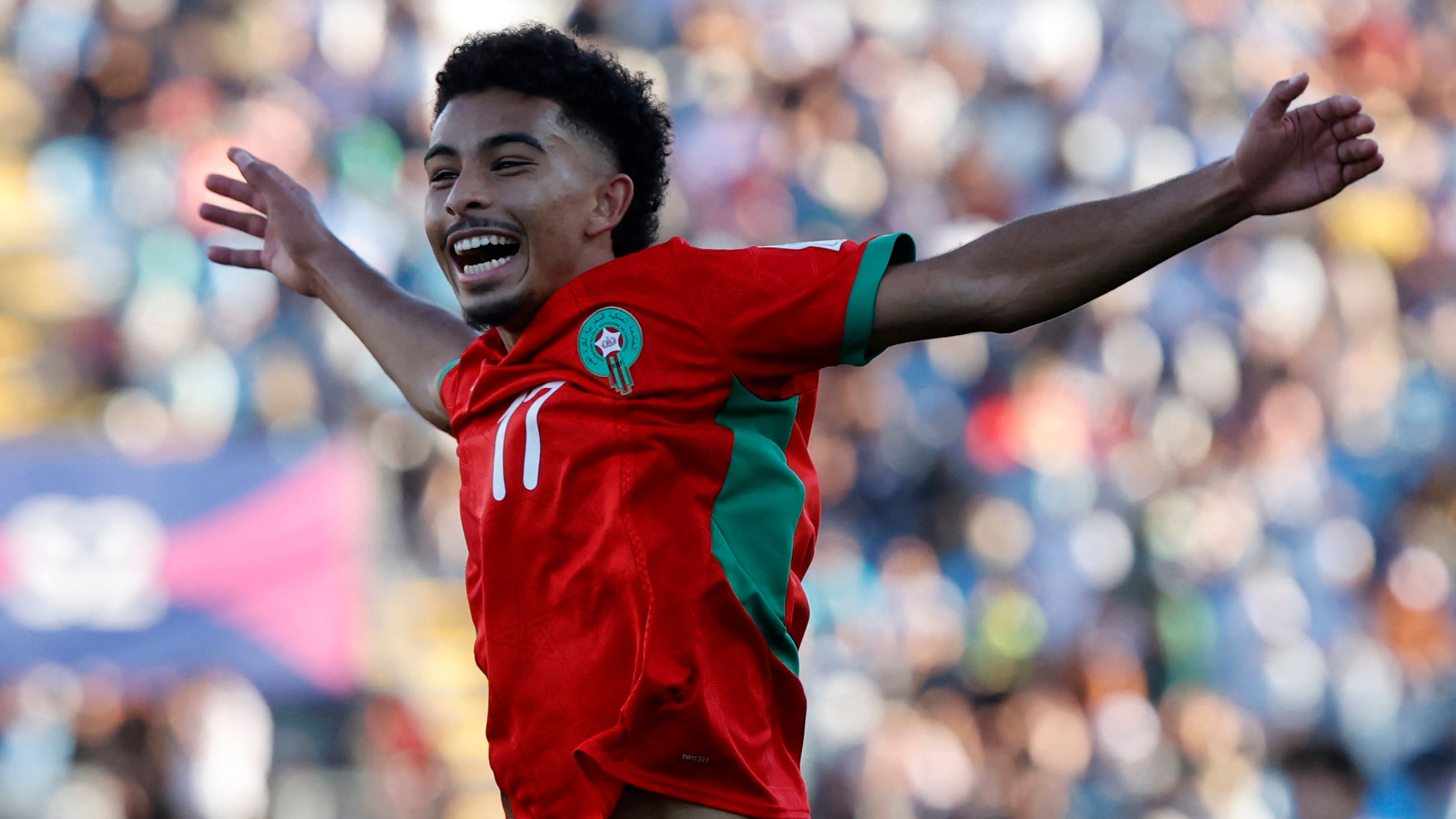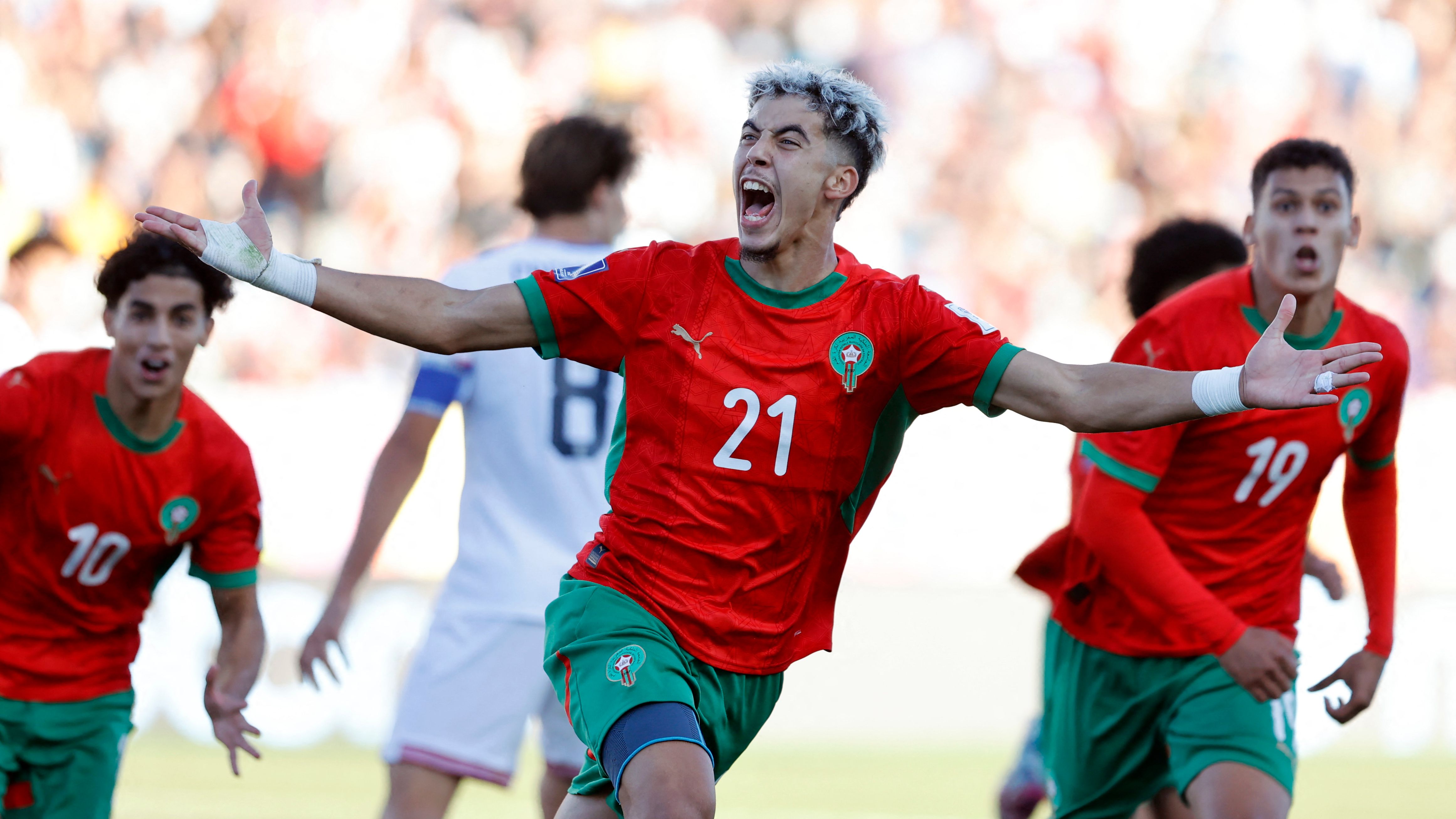



Morocco’s Dominant Second-Half Surge in the U20 World Cup
In a thrilling showdown at the U20 World Cup, Morocco demonstrated resilience and strategic prowess to overcome the United States, clinching a 3-1 win in the quarterfinals and advancing further in the tournament. This encounter, held in Rancagua, Chile, highlighted key moments that shifted the game’s momentum, ultimately showcasing how tactical adjustments can turn the tide in high-stakes youth soccer matches.
Initial Clashes and the Opening Strike
The match kicked off with mounting tension as both teams sized each other up. After a nail-biting first 30 minutes, Morocco‘s Fouad Zahouani broke the deadlock, netting the first goal and propelling his team ahead. This early breakthrough set a challenging tone for the United States, who quickly rallied. Just prior to the break, the Americans leveled the score when Campbell converted a penalty kick following an extended review of a foul that resulted in a yellow card for Ali Maamar. This equalizer momentarily energized the U.S. squad, allowing them to stabilize after enduring Morocco‘s initial offensive push.
Key Incidents in the First Half
Throughout the opening period, the game featured intense back-and-forth action, with the penalty decision emerging as a pivotal event. Campbell’s strike not only tied the game but also injected fresh confidence into the American lineup, echoing how a single moment can alter the flow of a contest much like a sudden storm changing the course of a battle.
The Game-Changing Own Goal and Defensive Battle
Post-interval, the contest took a decisive turn as Morocco regained control. Around the 20-minute mark of the second half, Yassir Zabiri’s attempt deflected off U.S. defender Wynder, resulting in an unfortunate own goal that handed Morocco the lead once more. This mishap compelled the United States to intensify their efforts, launching repeated assaults on the Moroccan backline in a bid to regain parity.
Opportunities Missed Amidst Pressure
Despite dominating possession and creating numerous openings, the Americans struggled to capitalize. Their most promising chance came through Luke Brennan, whose shot veered off target, illustrating the fine margins that often decide outcomes in the U20 World Cup. This phase underscored the frustration of generating momentum without converting it into results, akin to building a structure that crumbles at the final step.
Exploiting Counterattacks for the Decisive Goal
As the United States pushed more players forward in pursuit of an equalizer, they exposed vulnerabilities in their defense. Morocco capitalized on this in the 87th minute when Gessime Yassine pounced on a swift counter, scoring the match-sealing third goal. This strike exploited the gaps left by the aggressive American advance, much like a predator seizing an opening in a chase, and stemmed from a well-timed long pass that caught the opposition off guard.
The Impact of Transitional Play
The goal highlighted Morocco‘s effectiveness in rapid transitions, turning the United States‘ forward commitments into a liability. This tactical edge proved crucial, demonstrating how quick shifts in play can dismantle even the most determined offensive strategies.
Tournament Implications and Looking Ahead
With this hard-fought victory, Morocco progressed to the semifinals, marking another step in their impressive U20 World Cup campaign, while the United States faced elimination at the quarterfinals for the fifth consecutive event. The North African team’s next challenge awaits on Wednesday, where they’ll aim to maintain their momentum and push for the final rounds.
Final Reflections on the Match
This quarterfinal clash not only showcased the excitement of youth international soccer but also emphasized the role of adaptability and precision in achieving success on the global stage.
The Thrilling Quarterfinal Clash: Morocco vs. United States in U20 World Cup
Match Overview and Key Highlights
In the U20 World Cup quarterfinals, Morocco delivered a commanding performance to secure a 3-1 victory over the United States, turning the tide with decisive second-half goals. This matchup showcased the intensity of youth international soccer, where strategic adjustments and individual brilliance often decide the outcome. The U20 World Cup, a premier tournament for emerging talents, highlighted Morocco’s resilience as they advanced deeper into the competition.
The game kicked off with both teams displaying aggressive play, but it was Morocco’s ability to exploit opportunities in the second half that made the difference. The U20 World Cup stage often serves as a launchpad for future stars, and this match was no exception, with several players demonstrating skills that could translate to senior-level success.
- First-half dynamics: The United States took an early lead with a well-taken goal, putting pressure on Morocco’s defense. This set the stage for a comeback, emphasizing how momentum can shift in U20 World Cup games.
- Second-half turnaround: Morocco netted three goals post-interval, including a stunning brace from their forward line, which underscored their tactical depth and ability to adapt under pressure.
- Final score breakdown: The 3-1 result reflected Morocco’s dominance in possession and counter-attacks, a common theme in successful U20 World Cup campaigns.
This victory not only propelled Morocco to the semifinals but also demonstrated the evolving landscape of global youth soccer, where teams from Africa continue to make their mark.
Player Performances and Standout Moments
Several players stole the spotlight in this U20 World Cup quarterfinal, with Morocco’s attackers leading the charge. One standout was the Moroccan striker who scored twice in the second half, using precise finishing to capitalize on defensive lapses from the U.S. side. On the other end, the American goalkeeper made several key saves early on, but fatigue seemed to play a role as the game wore on.
In U20 World Cup history, such performances often signal a player’s rise. For instance, the Moroccan team’s midfield orchestrator was instrumental in controlling the pace, much like how past victors have used midfield dominance to secure wins. Here’s a quick look at the key contributors:
- Morocco’s top performers: The forward who bagged two goals exemplified the benefits of speed and accuracy, traits that are highly valued in U20 World Cup success stories.
- United States’ efforts: Despite the loss, their defender showed promise with solid tackling, offering a glimpse into potential future improvements for the team.
- Tactical insights: Morocco’s coach made effective substitutions in the second half, a move that directly led to the turnaround and highlighted the importance of in-game adaptability.
This match provided a case study in how U20 World Cup teams can overcome early deficits through better organization and player rotations, drawing parallels to previous tournaments where underdogs have triumphed.
Benefits of Following U20 World Cup Matches
Engaging with U20 World Cup events like the Morocco vs. United States quarterfinal offers numerous benefits for soccer enthusiasts. It provides a window into the future of the sport, allowing fans to scout emerging talents who might soon appear in major leagues or even the senior World Cup. For instance, watching these games can enhance your understanding of global soccer trends, such as the increasing influence of African nations in international competitions.
Moreover, following U20 World Cup action can inspire personal growth, like improving your own soccer skills by analyzing player techniques. Benefits include:
- Skill development insights: Observing second-half goals in this match can teach viewers about timing and precision, which are essential for aspiring players.
- Cultural appreciation: It fosters a deeper appreciation for diverse playing styles, as seen in Morocco’s fluid attacking play versus the U.S.’ structured defense.
- Community building: Fans often discuss these games online, creating opportunities for networking and shared excitement around U20 World Cup events.
Practical Tips for Enjoying U20 World Cup Games
If you’re a soccer fan looking to make the most of U20 World Cup viewings, here are some practical tips based on common experiences from past tournaments. Start by selecting reliable streaming services that offer high-quality broadcasts, ensuring you don’t miss crucial moments like the second-half surge in this Morocco victory.
- Preparation strategies: Research team lineups ahead of time using official U20 World Cup resources to anticipate key matchups, such as Morocco’s offensive threats.
- Engagement ideas: Take notes on player movements during games to analyze tactics later, which can make watching more interactive and educational.
- First-hand experience sharing: Many fans share that attending live U20 World Cup events builds lasting memories- if you’re planning to watch in person, arrive early to soak in the atmosphere and possibly meet fellow enthusiasts.
For a more immersive experience, try recreating match scenarios in pickup games with friends, using the Morocco vs. United States game as a blueprint for practicing comebacks.
Case Studies and First-Hand Experiences from U20 World Cup History
Looking at case studies from previous U20 World Cups reveals patterns that mirrored this quarterfinal. For example, in the 2019 edition, other underdog teams staged similar second-half comebacks, leading to unexpected victories. In this specific match, Morocco’s strategy echoed successful case studies where teams focused on high pressing after halftime.
From a first-hand perspective, many coaches and players recount how U20 World Cup pressures forge character. One former participant noted that experiences like this quarterfinal win against the United States helped them transition to professional leagues by building mental toughness and strategic awareness.
By examining such case studies, fans can gain valuable lessons on perseverance, a key factor in U20 World Cup triumphs. This approach not only enriches your viewing experience but also provides practical takeaways for anyone involved in soccer at any level.
Ultimately, events like this 3-1 Morocco victory highlight the excitement and growth opportunities within the U20 World Cup, encouraging more people to tune in for future matches.









